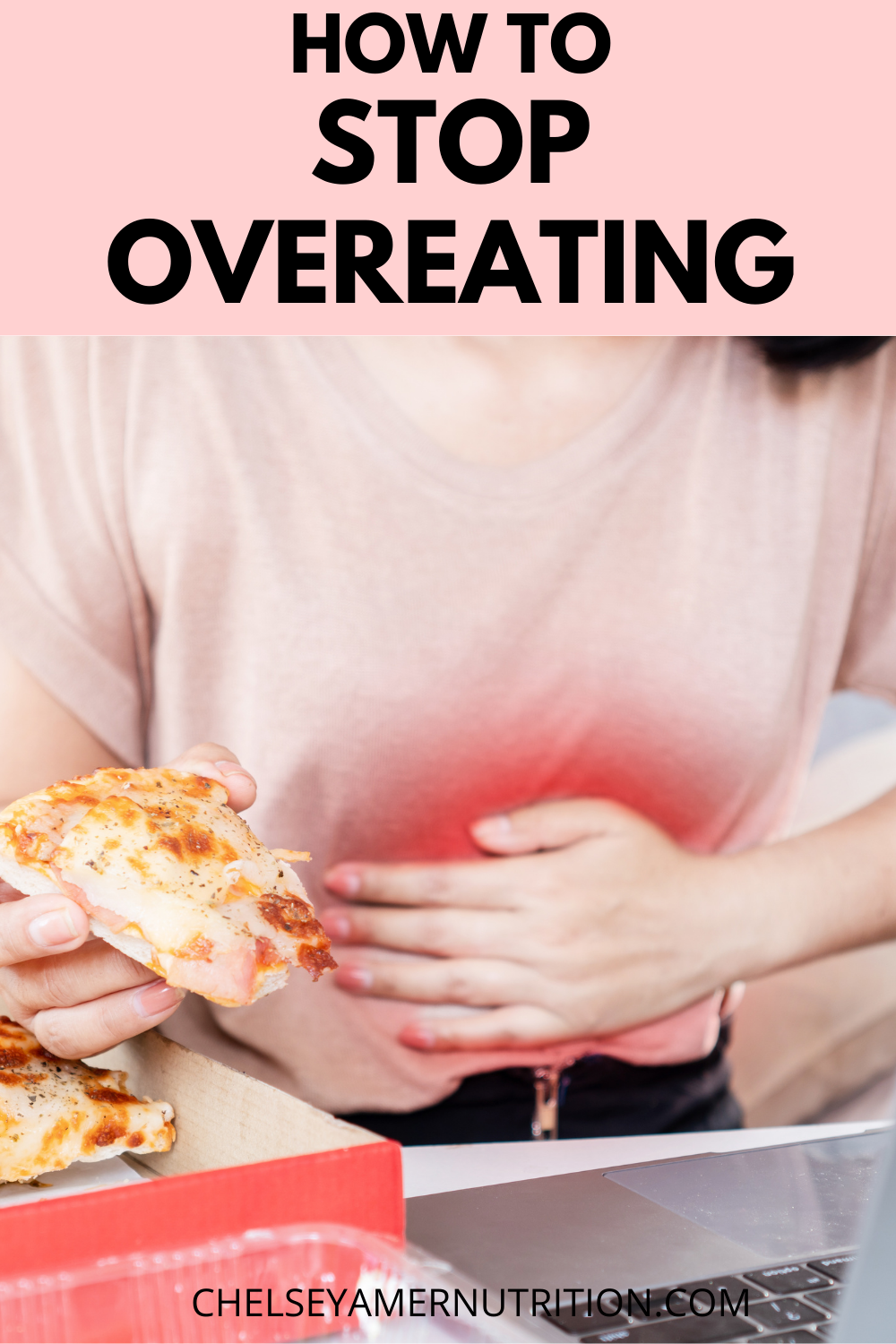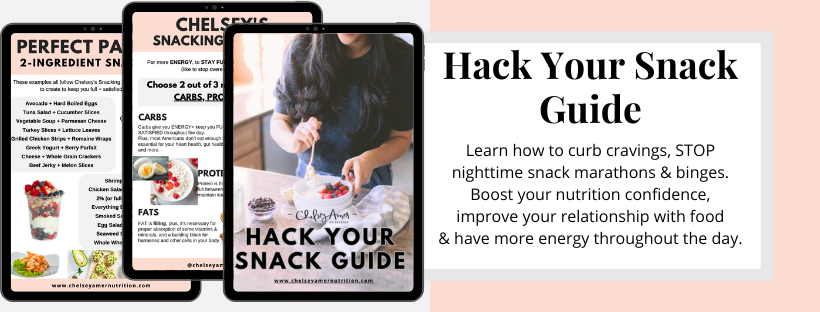How to Stop Overeating & Learn to Stop Eating When You’re Comfortably Full
If you want to learn how to stop overeating and how to stop eating when you’re comfortably full instead, you’re in the right place! This blog post will walk you through the essential foundational steps you can put into action to make sure you can check-in with your body and stop eating before you feel over-full, bloated, and sick (and then guilty!).

One of the most common questions I receive is “How can I stop overeating?”
It usually goes something like… “I eat so good all day, but then at dinner I feel like I just can’t stop eating. Food is so good and even if I know I’m full I don’t want to stop.”
Well, my friend, today we’re going to solve this common conundrum!
Here is my 5 step process for how to stop overeating…
But first, it’s important to understand WHY you’re overeating.
You’re NOT overeating because you…
- Lack willpower
- Have no control
- Are addicted to food
Despite what you’ve read, these just aren’t the case.
The reason you’re often overeating is more likely because you’re restricting somewhere in your diet, physically or mentally.
Even if you think you’re eating enough, there’s a real possibility and likelihood that you’re not eating enough, or not eating enough at the right times.
Overeating is rarely because you “just can’t stop.”
Overeating is typically rooted in a physiological drive to eat. Here are some common examples I see in my private practice…
- THE WORKING MOM: You’re a doctor and and mom, super busy with your kids in the morning, and then have back-to-back patients once you get to the office. You meant to eat the yogurt you threw in your bag, but you didn’t have time so you’ve been sneaking sips of coffee between patients. You don’t have a lunch break until 2pm. At lunch you “hold it together,” but by 5pm when you get home from work you’re ravenous and feel like you’re eating from when you walk in the door, through preparing dinner, and all evening.
It’s not you here… it’s that you physically haven’t eaten for most of the day! You now have a physiological drive to over-eat to “make up” for the lost energy earlier in the day.
- THE STAY-AT-HOME MOM: You have two kids in pre-school and elementary school. You’re not hungry when your kids eat breakfast at 7am, but by the time you do school drop off and go food shopping it’s now 10am and you’re absolutely ravenous. You eat breakfast (a couple of hard boiled eggs), fit in a walk, do laundry, and clean up the house before picking up your littleist from school. Naptime isn’t going as planned, so now you’ve pushed off lunch even further and you’re over-hungry again. You grab a bar, but it’s not enough. Your kid is enjoying goldfish for a snack at the park and you forgot to pack yourself anything, so you grab a handful too. Your older kid gets dropped off from school, then it’s running to activities and back home for dinner. You don’t have anything planned so you defrost chicken nuggets and that breaks the dam that is your evening snack marathon.
Without adequate planning, your meals fell short, even though you tried to grab food where you could. You physically didn’t eat enough calories for the day and your body is going to find a way to compensate. It’s usually with snacky foods that are high carb and high fat because those are hyperpalitable.
- THE WORK FROM HOME MOM: You’re a work from home mom with young kids. Even though your kitchen is right downstairs from your office, you often work through lunch in order to finish your day quicker to spend more time with your family. You’re in fight-or-flight mode to get as much done as psosible while you have childcare, so you don’t even feel hungry.
Here the issue is that you physically don’t feel your hunger cues. It’s not a good sign to have NO hunger cues for 4-5+ hours! This is a sign you need to check back in with your hunger cues. Again, you skipped meals so you’re more prone to over-eat later.
How to Stop Overeating
Now that you know some reasons why you may be overeating, here’s how to stop overeating, using my 5 step process.
1. Identify WHY you’re overeating
Where is the loophole in YOUR life? Are you…
- Pushing off breakfast?
- Skipping lunch?
- Under-eating at one of these earlier meals?
- Not planning an afternoon snack?
- Eating what you think you “should” versus what sounds delicious and satisfying to you?
It can be helpful to take inventory of your life.
ACTION STEP: Write out a play-by-play of your day. What does your average day look like from when you wake up until go to sleep. Write it out and find the loophole of where you may be under-eating, skipping meals, or pushing off meals until you’re ravenous.
2. Plan your meals
While you won’t have to do this forever, if you’re skipping meals or not eating enough, it can be helpful to plan out your meals for a few weeks to ensure you’re eating enough.
My ebook, Thrive in 5, contains 50 balanced meals you can make in 20 minutes or less and with just 5 ingredients each!
Especially for busy seasons of life, a meal delivery service can be helpful if it’s really hard for you to carve out the time to create balanced meals.
3. Eat enough
You cannot outsmart your body.
Your body knows when it hasn’t had enough to eat.
When you don’t have enough to eat, your body will “rebel,” or as I prefer, compensate by overeating at the next eating occasion. This can turn into a binge if you’re not careful.
How much should you eat? Well, that really depends on your body, your activity level, your season of life, and more. It’s normal for your energy (AKA calorie) needs to fluctuate throughout the month. If you really want to learn more about what your body needs, consider joining Small Group Coaching.
4. Eat consistently
Eating enough is important, but if you’re eating all your calories in a 2-hour window (let’s say you’re trying out some intermittent fasting – psst – not recommended for most women, especially if you overeat often!), you’re NOT eating consistently.
Eating consistently ensures you don’t get over-hungry, which is an essential step to stop overeating.
Even if you don’t feel hunger cues at first, it’s a good rule of thumb to eat every 3-4 hours to keep your blood sugar balanced and your energy elevated.
Need some snack ideas to make eating consistently a reality? Download my FREE Hack Your Snack Guide!
5. Eliminate distractions when eating
The last step to stop overeating is to truly tune in when eating. As hard as it is to eat without the TV on or put down your phone, it’s essential to become a more mindful eater. Eliminate distractions to pay more attention to your fullness.
Here are some more tips to honor your fullness:
- Know that you’ll be able to eat again when you’re hungry
- Visualize the hunger-fullness scale while eating
- Eat your most satisfying bites first – this helps you stop eating when comfortably full
NEXT STEPS… Want support to learn how to stop overeating?
- Download your copy of Binge to Balanced, my Guidebook that teaches you how to stop overeating and binging in detail and how to become a more confident, balanced eater.
- Book a free discovery call to learn more about 1:1 coaching
XO



 Hi there!
Thanks for stopping by! I'm Chelsey, an online Registered Dietitian, recipe developer, budding photographer, and coffee addict! My mission is to help you feel good through food by answering the question "What should I eat?" Let's make nutrition approachable!
I hope you enjoy my personal collection of simple, healthy, food allergy friendly and nutritiously delicious recipes, plus tips and tons of tricks that will help YOU live a nutritionally-balanced life! I look forward to getting to know you better...
Hi there!
Thanks for stopping by! I'm Chelsey, an online Registered Dietitian, recipe developer, budding photographer, and coffee addict! My mission is to help you feel good through food by answering the question "What should I eat?" Let's make nutrition approachable!
I hope you enjoy my personal collection of simple, healthy, food allergy friendly and nutritiously delicious recipes, plus tips and tons of tricks that will help YOU live a nutritionally-balanced life! I look forward to getting to know you better...







